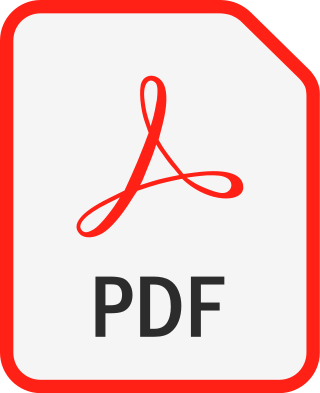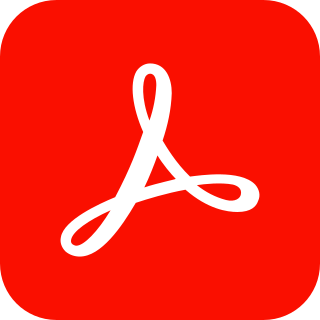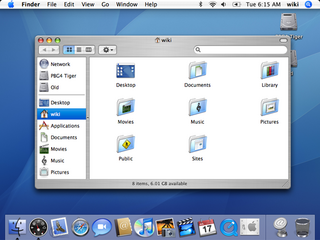
Microsoft Word is a word processing program developed by Microsoft. It was first released on October 25, 1983, under the name Multi-Tool Word for Xenix systems. Subsequent versions were later written for several other platforms including: IBM PCs running DOS (1983), Apple Macintosh running the Classic Mac OS (1985), AT&T UNIX PC (1985), Atari ST (1988), OS/2 (1989), Microsoft Windows (1989), SCO Unix (1990), Handheld PC (1996), Pocket PC (2000), macOS (2001), Web browsers (2010), iOS (2014), and Android (2015).

macOS, originally Mac OS X, previously shortened as OS X, is a Unix-based operating system developed and marketed by Apple since 2001. It is the primary operating system for Apple's Mac computers. Within the market of desktop and laptop computers, it is the second most widely used desktop OS, after Microsoft Windows and ahead of all Linux distributions, including ChromeOS and SteamOS. As of 2024, the most recent release of macOS is macOS 15 Sequoia, the 21st major version of macOS.

Portable Document Format (PDF), standardized as ISO 32000, is a file format developed by Adobe in 1992 to present documents, including text formatting and images, in a manner independent of application software, hardware, and operating systems. Based on the PostScript language, each PDF file encapsulates a complete description of a fixed-layout flat document, including the text, fonts, vector graphics, raster images and other information needed to display it. PDF has its roots in "The Camelot Project" initiated by Adobe co-founder John Warnock in 1991. PDF was standardized as ISO 32000 in 2008. The last edition as ISO 32000-2:2020 was published in December 2020.

vi is a screen-oriented text editor originally created for the Unix operating system. The portable subset of the behavior of vi and programs based on it, and the ex editor language supported within these programs, is described by the Single Unix Specification and POSIX.

Safari is a web browser developed by Apple. It is built into several of Apple's operating systems, including macOS, iOS, iPadOS and visionOS, and uses Apple's open-source browser engine WebKit, which was derived from KHTML.

Adobe Acrobat is a family of application software and web services developed by Adobe Inc. to view, create, manipulate, print and manage Portable Document Format (PDF) files.

iMovie is a free video editing application made by Apple for the Mac, the iPhone, and the iPad. It includes a range of video effects and tools like color correction and image stabilization, but is designed to be accessible to users with little or no video editing experience. iMovie's professional equivalent is Apple's Final Cut Pro X.

Maxthon is a freeware web browser, created by JeffChen in Singapore. It is available for Windows, macOS, Linux, and as Maxthon Mobile for Android, iOS, and Windows Phone 8. Since version 6, Maxthon is based on Chromium.

XNU is the computer operating system (OS) kernel developed at Apple Inc. since December 1996 for use in the Mac OS X operating system and released as free and open-source software as part of the Darwin OS, which, in addition to being the basis for macOS, is also the basis for Apple TV Software, iOS, iPadOS, watchOS, visionOS, and tvOS.

Mac OS X Tiger is the 5th major release of macOS, Apple's desktop and server operating system for Mac computers. Tiger was released to the public on April 29, 2005, for US$129.95 as the successor to Mac OS X 10.3 Panther. Included features were a fast searching system called Spotlight, a new version of the Safari web browser, Dashboard, a new 'Unified' theme, and improved support for 64-bit addressing on Power Mac G5s. Mac OS X 10.4 Tiger also had a number of additional features that Microsoft had spent several years struggling to add to Windows with acceptable performance, such as fast file search and improved graphics processing.

Pages is a word processing program developed by Apple Inc. that is part of the iWork productivity suite. It runs on the macOS, iPadOS, and iOS operating systems and is also available on the iCloud website. The first version of Pages was released in February 2005. Pages is marketed by Apple as an easy-to-use application that allows users to quickly create documents on their devices. Many Apple-designed templates comprising different themes are included with Pages.

Apple Remote Desktop (ARD) is a Macintosh application produced by Apple Inc., first released on March 14, 2002, that replaced a similar product called Apple Network Assistant. Aimed at computer administrators responsible for large numbers of computers and teachers who need to assist individuals or perform group demonstrations, Apple Remote Desktop allows users to remotely control or monitor other computers over a network. Mac Pro (2019), Mac mini with a 10Gb Ethernet card, and Mac Studio (2022) have Lights Out Management function and are able to power-on by Apple Remote Desktop.

Scrivener is a word-processing program and outliner designed for writers. Scrivener provides a management system for documents, notes and metadata. This allows the user to organize notes, concepts, research, and whole documents for easy access and reference. Scrivener offers templates for screenplays, fiction, and non-fiction manuscripts. After writing a text, the user may export it for final formatting to a standard word processor, screenwriting software, desktop publishing software, or TeX.
This page is a comparison of notable remote desktop software available for various platforms.

iOS is a mobile operating system developed by Apple exclusively for its mobile devices. It was unveiled in January 2007 for the first-generation iPhone, which launched in June 2007. Major versions of iOS are released annually; the current stable version, iOS 18, was released to the public on September 16, 2024.

OpenZFS is an open-source implementation of the ZFS file system and volume manager initially developed by Sun Microsystems for the Solaris operating system, and is now maintained by the OpenZFS Project. Similar to the original ZFS, the implementation supports features like data compression, data deduplication, copy-on-write clones, snapshots, RAID-Z, and virtual devices that can create filesystems that span multiple disks.

OS X Yosemite is the eleventh major release of macOS, Apple Inc.'s desktop and server operating system for Macintosh computers.

OS X El Capitan is the twelfth major release of macOS, Apple Inc.'s desktop and server operating system for Macintosh. It focuses mainly on performance, stability, and security. Following the California location-based naming scheme introduced with OS X Mavericks, El Capitan was named after a rock formation in Yosemite National Park. El Capitan is the final version to be released under the name OS X. OS X El Capitan received far better reviews than Yosemite.
Comparison of user features of operating systems refers to a comparison of the general user features of major operating systems in a narrative format. It does not encompass a full exhaustive comparison or description of all technical details of all operating systems. It is a comparison of basic roles and the most prominent features. It also includes the most important features of the operating system's origins, historical development, and role.














